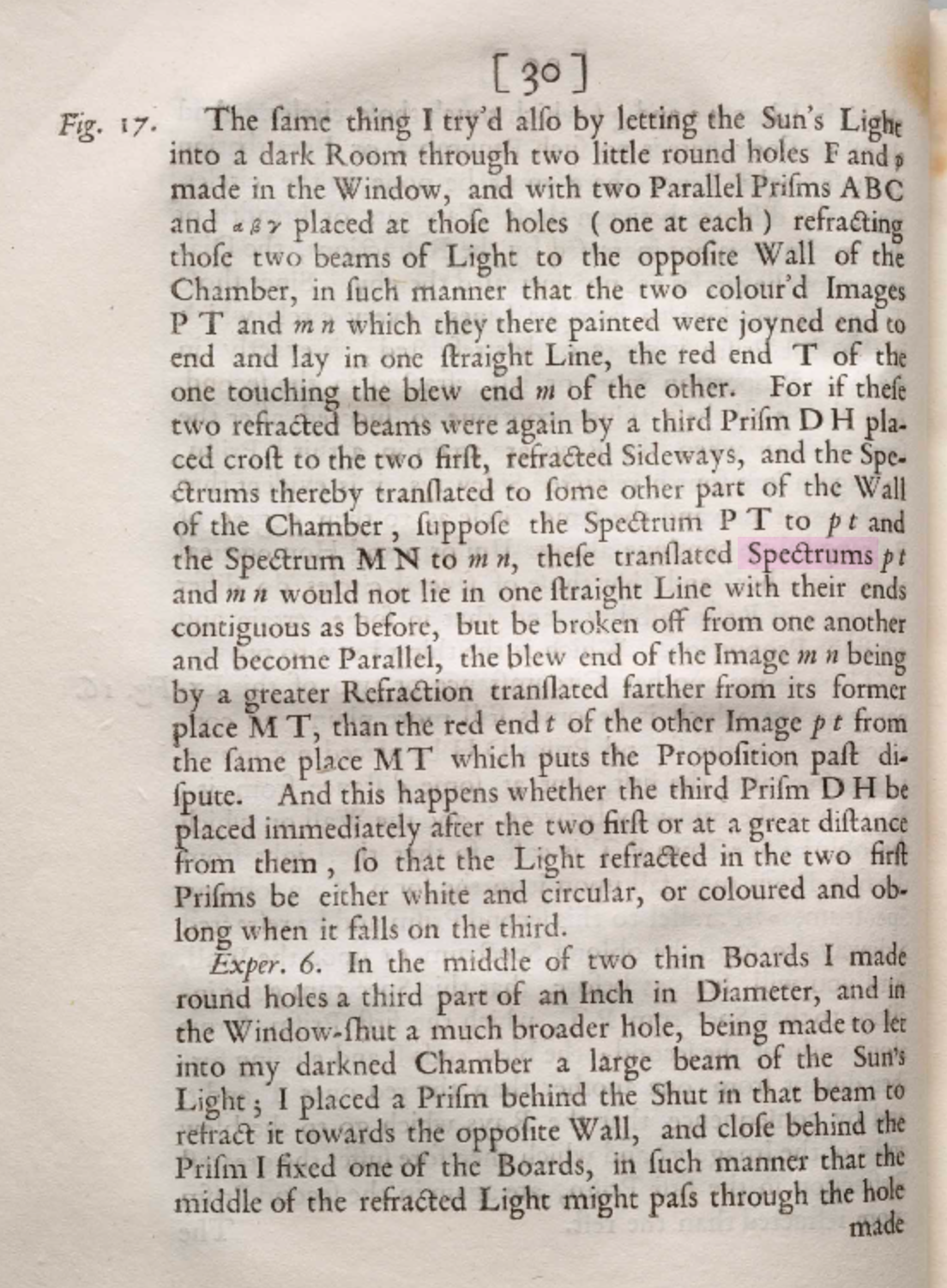Isaac Newton on spectrums
« previous post | next post »
In "Spectrums", 2/24/2022, I described a struggle with magazine editors, long ago, over whether the plural of spectrum should be "spectrums" (which they wanted) or "spectra" (which was then the norm in technical discussions of acoustics, and remains so). In a comment, rpsms noted that
Newton arguably "revived" the word spectrum (at least in scientific work) in "Optiks" and I note that he uses "spectrums." "Spectra" does not seem to appear at all in the printed work.
It's true — from p. 30 of the 1704 first edition of Newton's Opticks:
And the OED cites Newton 1672 as the source for this usage:
1672 I. Newton in Philos. Trans. 1671 (Royal Soc.) 6 3076 Comparing the length of this coloured Spectrum with its breadth, I found it about five times greater.
1675 I. Newton in Philos. Trans. 1674 (Royal Soc.) 9 218 The Sunbeams..passing through a Glass Prism to the opposite Wall, exhibited there a Spectrum of divers colours.
It's worth noting that earliest attested sense of spectrum in English is "An apparition or phantom; a spectre", attested a few decades earlier:
1611 J. Speed Hist. Great Brit. ix. xiv. 616/2 Walsingham hath written of a fatall Spectrum or Apparition.., where sundry monsters of diuers colours..were..seene.
1649 J. Bulwer Pathomyotomia ii. ii. 140 Feare also, and a Sudden fright or Spectrum,..hath the same effect sometimes upon the Muscles of the Face.
And spectre in turn is just a few years earlier:
1605 Z. Jones (title) A Treatise of Specters or straunge Sights, Visions and Apparitions appearing sensibly unto men.
This reminds me of a story I heard about the early days following the development of the sound spectrograph, whose WWII development was revealed to the public in 1946. At a welcoming party for a newly-hired faculty member at a prominent American liberal arts college, the president's wife engaged the new hire in enthusiastic conversation about the fact that the revelations of spiritualism were finally being given a scientific foundation through the use of the spectrograph to record and measure spectres.
Anyhow, based on Newton's precedent, maybe we should have been trying to persuade the editors of JASA to let us use "spectrums", rather than arguing with Scientific American about "spectra". But of course Horace drew the relevant conclusion more than two thousand years ago: "si volet usus / quem penes arbitrium est et ius et norma loquendi" ("if it be the will of custom, in the power of whose judgment is the law and the standard of language").

Olaf Zimmermann said,
May 26, 2022 @ 1:31 pm
Permit me four perhaps overly tangential remarks:
Data, lexica, referenda, spectra – I suppose it is all a matter of when and where you went to school (si volet usus). A neighbour of mine once told me that he misses the sell of leaded gasoline.
This being said, in my early days at university – I'm an e2ellish person – I had a psychology professor (from the US) who pronounced 'data'as 'Dada' – took me about half a minute to sort that one out (although in view of the current replication crises she may have inadvertently anticipated a point). Nevermind the ambitious (ambient?) philosopher who kept going on about a certain Daycart – when I finally asked if he was referring to the fellow who had said 'coeo ergo sum' he replied in the affirmative [sigh!](Note: nowadays monoglots can get a PhD in philosophy!)
The typesetting of the page from Opticks is simply beautiful and easy on they eye – there's a reason why so many of us partake in The Joy of TeX (as that's all we've got left).
En guise de conclusion, had the speech spectograph, and subsequent research by Irwin Pollack, been around in Karl Bühler's days, it might have saved the latter much effort. And a Saussure – whose 'signe'is a morpheme, no more, no less – would have greatly benefitted from it. But they were all children of their time.
Ed Hall said,
May 27, 2022 @ 3:33 am
What else should we expect from the discipline that came up with cepstrum/cepstra… or is it cepstrums?
(I just now learned that a filter that acts on a cepstrum is called a lifter. I've seen quefrency but this is going too far!)